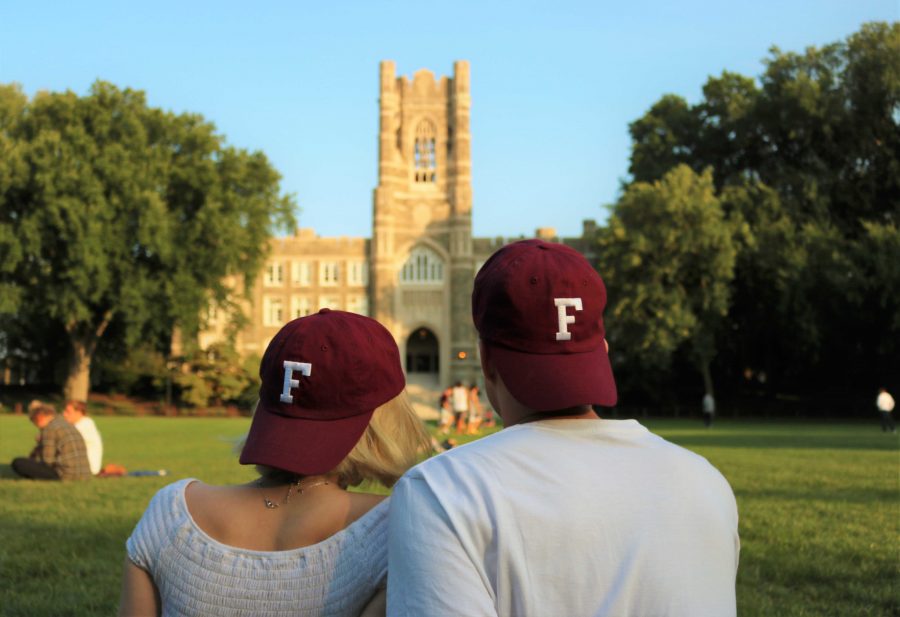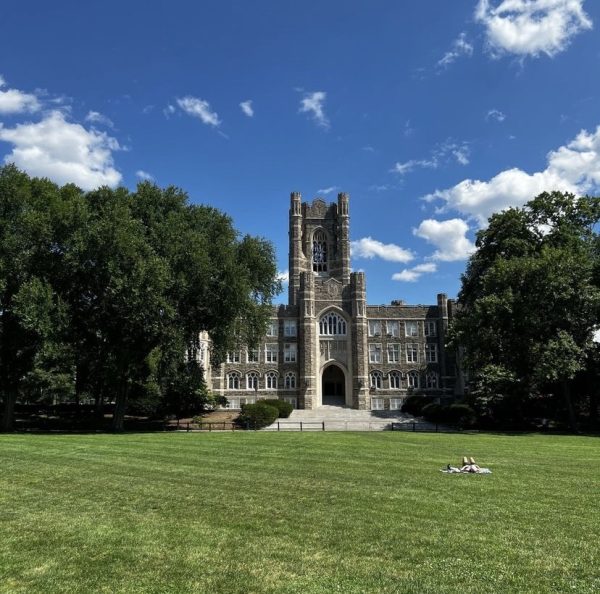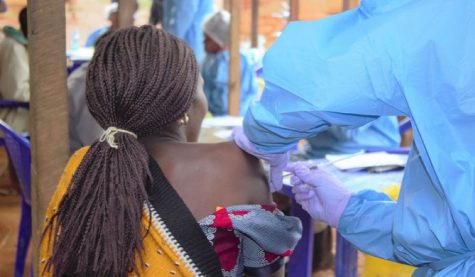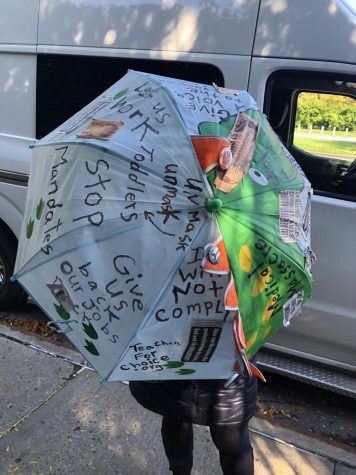Fordham Community Expresses Uncertainty Amid COVID-19 Cancellations
Members of the Fordham community were forced to adjust quickly during coronavirus cancellations. (Courtesy of Ram Archives)
After switching to online classes for the rest of the spring semester due to the novel coronavirus on Friday, March 13, Fordham University has asked all residential students to move out of their dormitories by Friday, March 20. As such, Fordham’s residential students and local businesses have been affected for the foreseeable future. The Fordham Ram spoke to several university affiliates and local Belmont-area residents about their current situations.
Despite the class cancellation, some students found themselves wanting to stay on campus for a variety of reasons: to be with friends, to be in New York or they simply have no place else to go.
“I 100% wanted to stay on campus, and most definitely did not want to go home,” stated Teresa Jacobs, FCRH ’23. “Being at Fordham has really felt like my real home for a long time.”
Aside from the social aspect, international students faced issues with the inability to go home. Weijia Fiona Chen, FCRH ’20, is from Beijing, where she said she could not return for precautionary reasons.
“As an international student, I do not have a permanent place to stay in this country, so technically I am homeless without on-campus housing,” she said. “I am just very grateful that my roommate Jennifer and her family took me in during this difficult time. I really think that Fordham should have at least one dorm open.”
On Monday, March 16, Rose Hill’s United Student Government issued a proposal that the Office of Residential Life leave O’Hare Hall open for the remainder of the semester in order to help students with extenuating circumstances. The university has yet to respond.
Domestic students worried about traveling by air and possibly contracting the coronavirus at airports and bringing it home.
“I did plan to stay on campus,” said Jeffrey Pelayo, FCRH ’21, a resident assistant from Seattle, the city with the second-highest number of COVID-19 cases in the U.S. “I want to see my family but I don’t feel comfortable flying across the country and possibly getting any people sick.”
During this time, students like Pelayo have experienced stress and anxiety because they have limited to no options for housing.
“It’s been extremely stressful trying to figure out where I’m going to live because for now I don’t know where I’m staying after March 20,” he said. “One way I’ve been dealing with the stress is just trying to spend as much time with other people as I can, especially the other RAs because they’re in a similar boat.”
With on-campus residents returning to their respective homes and new restrictions from Mayor Bill de Blasio on restaurants, local businesses have been taking a hit. Starting Monday, March 16, at 8 p.m., restaurants were required to offer delivery and takeout only, should they remain open.
“It has definitely affected us tremendously, we have almost slowed down to a stop,” said Pietro Natale of Pugsley Pizza. “Had to lay off workers because of this. … But health comes first before anything else.” On Thursday, March 19, Pugsley’s Instagram posted a video saying it will remain open for orders.
Other businesses, such as Rams Deli Plus on Fordham Road, have not resorted to letting employees go. Wahaeb Alfahad said his and his coworkers’ hours were cut in half and that they are helping each other out during this time.
“Now that college shut down, all the business is shut down,” Alfahad said. “Like you see now, nobody is here. Everybody went home. … The boss gave me half hours, like half days. I can’t work because he can’t pay me.”
Paulina Kajtazi of Simons’ Deli voiced her concern for her business as well as her neighborhood.
“All of the neighborhood is miserable,” she said. “Some people got a small frigideira. Who’s gonna take care of people like that? … Business is dead, so it’s very bad.”
Due to the new restrictions, bars are closed indefinitely. Daniel “Suits” Morse of Mugz’s told the Ram that he has started looking for new work while also focusing on helping on-campus students find new temporary housing in the Belmont area.
“I got a call last night from one person, then it went to 10 other people … that they’re gonna need places to stay, so I jumped on it, and I started calling landlords,” he said. “I have one landlord who’s willing to do (rent out for a month or two).”
Besides housing, another of many students’ concerns is taking classes digitally.
Malak told the Ram, “The transition to online classes has been surprisingly easy. My professors have been really great about everything. I’m not worried about my education.”
David Wright, Ph.D., a lecturer in the classics department, said that while he prefers face-to-face discussion with his students, he has been able to adjust to online teaching via the program Zoom.
“Thankfully, we live in a time when there are so many tools available to keep us engaged, and I’ve already enjoyed finding ways to create a dynamic connection with my students via Zoom this past week,” he said. “While … I do not believe that online learning can fully replace the classroom experience, I do know that the Fordham community will continue to find creative and inspiring ways to remain connected to one another.”
Stephen Bragale, FCLC ’21, is grateful for the switch to online classes: “I have asthma and I commute via subway to school, so I appreciate that this dramatic decision … protects vulnerable people like me.”
However, others have had different experiences.
“Online classes are tough to follow,” said Adam Borak, FCRH ’20. “My professors don’t have it quite down.”
Meanwhile, Jacobs stated that digital classrooms do not facilitate learning for those with disabilities.
“Already having to personally deal with learning disabilities & having exam accommodations at the Office of Disabilities Services, I could already see how terrible this experience is going to be more with the rest of the semester,” she said. “It becomes awfully easy for me to gradually slip under the cracks academically & struggle.”
Depending on the course, students may find completing certain assignments more difficult. STEM classes may see this issue more often than others.
“I am concerned about my final projects since they were going to involve a lot of office hours,” said Mary Kohl, FCRH ’20, who is a math and informational systems major and chemistry minor. “Other than that, I think the classes I’m enrolled in right now will make the transition to online classes easier but I could not imagine being an (underclassman) in STEM right now. I would not have gotten through some of my more difficult STEM classes if I could not see my friends in class every day and cannot imagine what the lab situations are going to look like. Good luck to everyone out there — especially those in (organic chemistry).”
Currently, there is a student-made petition on change.org requesting that Fordham render its classes pass/fail for the semester, citing reasons similar to Jacobs’ and Kohl’s concerns. Ultimately, many in the Fordham community acknowledge that using programs like Zoom or posting discussions on Blackboard is not comparable to the classroom experience on campus.
“None of these (online) platforms have been able to mimic the state-of-the-art, Fordham-quality education that our hefty tuition payments promise,” said Setaro.
During the week of March 16, the university is on its spring recess, allowing for students and faculty to take a break from online classes. Because of the COVID-19 pandemic, many students found themselves canceling their spring break trips.
“We decided to cancel our trip to Barcelona a couple of weeks ago due to travel concerns and risks of transmission,” said Laurel Dillon, FCRH ’20.
Pelayo found himself modifying his spring break trip until it was ultimately canceled: “Every day, it seems that there’s always something in the news that changes my decision. So it went to going to Texas to going to Miami to going home to going on a road trip to Lake George to scrambling to find an apartment off campus.”
Borak still went through with his vacation to Puerto Rico but ended up shortening it.
“I traveled over spring break but cut the trip short in shock of the virus,” he said. “It’s made me more conscious about health and makes me realize all my bad habits.”
For many students, this time has been stressful and has caused them to change up their routines.
“Right now my living has changed quite a bit,” said Dillon. “I wash my hands every time I come into my apartment. Focusing on social distancing and helping flatten the curve is my biggest concern now.”
Practicing cleanliness, moving home and taking classes are just a few of the tasks Fordham’s students have to deal with right now. Some, like Chen, who shared her perspective on “coronavirus-inspired hate crime,” experience additional stressors.
“As an Asian person, these past couple of weeks have just been tough, knowing that it is possible that I will get assaulted in public or be treated differently,” she stated. “When I am out in public I definitely feel that some people are trying to avoid being close to me. Some people also gave me weird looks.”
Moving forward, it is not clear when the outbreak of COVID-19 will slow down or end. For seniors such as Malak, this is a concern as graduation draws closer.
“I’m a little nervous about job search prospects,” she stated. “That said, everyone’s in the same boat here. I’m remaining cautiously optimistic that employers will be understanding. I also think we have to assume that hiring procedures will most certainly be changing due to the COVID-19 crisis.”
By April 8, the university will make a decision on whether commencement and Senior Week will take place during the week of May 11. Fordham’s seniors stated their simultaneous hopes and worries concerning it.
“I just hope that the administration takes its time when deliberating what to do in regards to Senior Week and graduation and does everything in its power to ensure that the Class of 2020 get the send-off that it deserves,” said Setaro.
The university and those affected acknowledge that these have been tough yet necessary decisions.
“I don’t think anyone’s in a position to judge,” stated Malak. “This is a global crisis; it’s completely unprecedented. There is no ‘right call’ here.”
However, the overall uncertainty from students does not prevent them from looking forward, as Chen stated, “This whole pandemic is not only an attack on our health but also a test for humanity, and we cannot let it win.”
Copy Chief for Volume 101.












































































































































































































